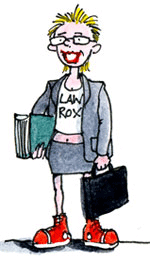The wrong right
 Barely Legal •
Barely Legal •  Sunday, April 16, 2017
Sunday, April 16, 2017 Student gloom ... The injustice of multiple choice exams ... Degrees of rightness ... The hard art of law ... Law school admission and PTSD ... Predicting the examiners thought processes ... Barely Legal picks the "wrong" right answer
 Tuesday, 9am. Time to wrap our undercaffeinated brains around Admin Law. But in this particular seminar the only kind of procedural unfairness we could think about was the previous day's Property exam. The atmosphere of gloom suggested that lasting damage had been done to our egos.
Tuesday, 9am. Time to wrap our undercaffeinated brains around Admin Law. But in this particular seminar the only kind of procedural unfairness we could think about was the previous day's Property exam. The atmosphere of gloom suggested that lasting damage had been done to our egos.
"I studied for weeks," someone moaned. "For what?"
The test's questions had been laced with red herrings designed to trick us, we fumed. Much of the hour-long test had also been spent just reading the complicated hypothetical scenarios, full as they were of adversely possessed flower gardens, flagpole licences, and stolen fuchsia bicycles.
We gathered that whichever teacher wrote the questions had done so during a sojourn to Castlemaine, as that jewel of country Vic turned up no fewer than three times in a 24-question test.
Legitimate gripes. Yet, to me, there had been an even greater injustice: the exam had been multiple choice.
"Most questions on the exam will have more than one right answer," our Property teacher had explained, puncturing the premature rapture of the course's former Commerce students. "But one right answer will be right-er than the others."
I paraphrase for the sake of drawing an Orwellian parallel, of course, but my despair was genuine. What if I kept picking the "wrong" right answer and failed the exam? Never mind that our entire legal education to this point had centred on teaching us to make good arguments. Was not multiple choice the archnemesis of the established pedagogy?
"I'm an Arts student," I vented to a non-Law friend. "This isn't Chemistry!"
Non-Law Friend snorted. "Well, if social science is a 'soft' science, then Law is a 'hard' art."
True enough, and this multiple choice exam was not Barely Legal's first rodeo. It was highly probable that my conniptions over the multiple choice exam stemmed from a future DSM-VI entry called LSAT PTSD.
Whether the Law School Admissions Test is an effective indicator of a student's aptitude for studying law is controversial. Unfortunately, Barely Legal's hallowed institution realised a while back that accepting students on the basis of a score spat out by an expensive American test was cheaper than paying admissions staff to read personal statements.
Barely Legal is not good at multiple choice tests. Inevitably, more than a single answer will seem probable and appealing. The process of elimination is only good for chucking one or two answers overboard before the last three beg for merits review. Even when I know the right answer in my bones, self-doubt will grip me when I try to move on. Temptation exhorts me to go back, to second-guess every decision and re-examine every angle.
I remember slouching over fat volumes of LSAT prep materials in my final year of undergrad. Progress was minimal. As the months crawled by I tried to internalise the LSAT writers' thought process. How would they answer this stupid goddamn question? Granted, trying to intuit answers to questions of Pure Unadulterated Logic was neither a wise nor effective strategy.
And so test after practice test, I'd keep shading in the wrong answers. How? I'd demand of the faceless LSAT question-framer before me, hands itching to throttle this ghoul. How is that the right answer? Can you actually prove the answer I circled is wrong?
In the end, I scored the exact minimum number I needed to scrape into law school. This meant that I felt like an academic impostor for most of first year. It wasn't until later that I realised you can get by in law school just fine if you have a decent memory, case note formatting skills and a hand impervious to cramping during exams.
In many ways, then, the Property test was a throwback to a darker time in my life. But I don't think I was alone. Monday's exam had been completed online. It was multiple choice. Scores would be calculated by the computer automatically. And yet four days later, none of us knew our mark. The results had to be "verified", our Property teachers claimed. Regard must first be had to "equity" before they could be released.
You don't need to score 180 on the LSAT to understand this means that most of my cohort failed the exam and faculty was scrambling to bell curve the crap out of the debris.
Let that be a lesson to you about multiple choice, teachers. Don't let schmucks like me into law school then act surprised when we pick the "wrong" right.
 Examinations,
Examinations,  Law students
Law students 








Reader Comments